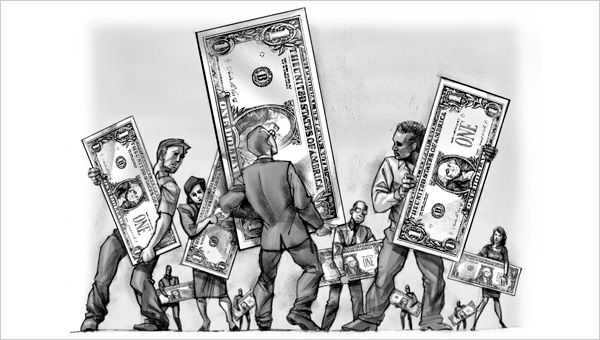The Big Political Issue for 2014: “Income Equality”
Amy Payne from the Heritage Foundation reports, “Do a Google News search for ‘income inequality’ and it will remove any doubt that this is already the political issue of 2014.”
Both parties has been gearing up for months. The liberal Center for American Progress launched a new center devoted to the subject, and President Obama has been making it a centerpiece of his speeches. Even Florida Governor Rick Scott (R) and challenger former Governor, now Democrat candidate, Charlie Crist have made income inequality an issue in their campaigns.
“Get ready to hear about “fairness”—because some people make more money than others, and this isn’t fair. How can you sit by and watch this happen? What is the government going to do about it?”, writes Payne. “It’s a popular argument because everyone—even Warren Buffett—wants to make more money. When someone tells you that what you’re being paid isn’t fair, it’s easy to agree. And if that someone tells you that you can march in a protest and instantly make more money—well, that’s a lot quicker and easier than working toward your next promotion.”
Payne warns, “Quick and easy—that’s the allure of the left’s argument. But there are two things you should know about it.”
1. It’s too good to be true.
The income inequality outrage is based on the idea that the people at the bottom of the economic ladder are stuck there indefinitely. But America isn’t “Downton Abbey”—you’re not stuck in the place where you were born. The chauffeur’s son can become…whatever he wants to be in America.
This uniquely American advantage is called mobility. People can move up—and down—the income ladder. In fact, “the recent rise in income disparities has not caused a decline in upward mobility,” reported Heritage’s Rea Hederman and David Azerrad in an in-depth study of the issue. They debunked the foundation of the left’s assumptions:
Standards of living have increased for everyone—as have incomes—and mobility, however one measures it, remains robust. Simply put, how much the top 1 percent of the population earns has no bearing on whether the bottom 20 percent can move up.
A focus on minimum-wage workers can also be a red herring. Heritage’s James Sherk and John Ligon note that “Over two-thirds of workers starting out at the minimum wage earn more than that a year later.”
2. It hurts people.
The left’s income inequality argument has a sad and destructive irony: If it’s made into public policy, it makes it more difficult for people to get a job and achieve their American Dream.
President Obama and his allies in Congress are already pushing for a minimum wage increase in the new year. Heritage’s Sherk and Ligon are very clear when it comes to the possible consequences of doing this: It “would force employers to curtail hiring.”
Less hiring. Fewer job opportunities. That does not help the men and women looking for work, who need to put food on the table and shoes on their kids’ feet.
The New York Times notes, however, that the issue of the minimum wage could help liberal politicians looking for voter turnout in the upcoming midterm election. And that’s all it is: a political ploy that manipulates Americans in the name of power.
EDITORS NOTE: Income equality is all about coveting what someone else has. Coveting has been recognized for centuries as a powerful force for political and social evil. That is why it is a sin and one of the Bible’s Ten Commandments as written in Exodus 20 (NIV version): “You shall not covet your neighbor’s house. You shall not covet your neighbor’s wife, or his male or female servant, his ox or donkey, or anything that belongs to your neighbor.”


